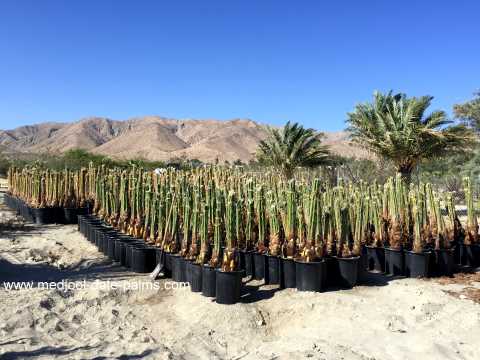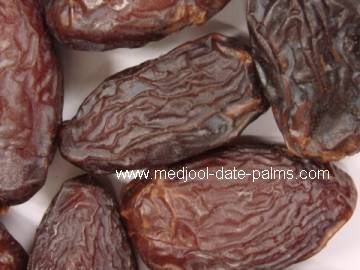MEDJOOL DATE PALM OFFSHOOTS
Medjool Date Palm Offshoots
The true date palm ("phoenix dactylifera") has two distinct developmental phases. The first stage is vegetative and occurs during the early immature years of the date palm's life. In this early vegetative stage, buds form in the new leaf axils of the date palm, and in time these buds develop into identical offshoots which can be removed and planted.The removal and planting of these date palm offshoots has been the only way that a particular variety of date palm could be preserved and propagated since ancient times.
The medjool date palm originated centuries ago in Morocco where it was so highly esteemed that it was reserved only for the royal family of the Sultan! It was not until just 85 years ago that the first medjool date palm offshoots were imported into the USA.
Seedling date palms are hybrids. Date palm seedlings are not true to type, and 50% of date palm seedlings are males which do not produce dates! The dates of most female date palm seedlings are inferior in quality to the original date whose seed was planted.
By means of offshoot propagation, identical date palms of superior quality cultivars like the medjool date palm have been passed down from one generation to the next for hundreds of years. Some date palm cultivars like the zahidi date palm have been propagated as identical offshoots in this manner for several thousand years!
Fresh Cut Medjool Offshoots
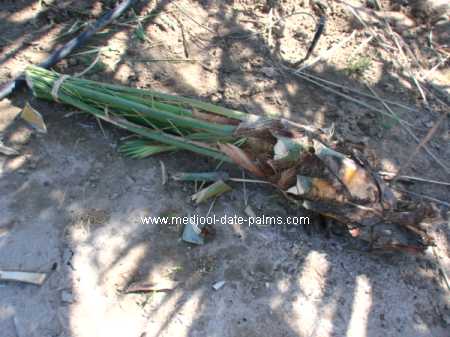
When fresh cut medjool date palm off-shoots are planted directly out in the field, they can begin to produce dates 5-7 years after being planted.
However, fresh cut date palm offshoots are extremely perishable. Fresh cut date palm offshoots experience severe immediate dehydration when removed from the mother palm, and a significant percentage do not survive, even under the best circumstances with experienced farmers tending the fresh cut off-shoots.
Between one and two years after planting, the succesful offshoots will have developed enough new roots to begin putting out vigorous new foliage growth.
With proper care, after another 3-5 years the offshoots will actually begin producing dates, depending on the original size of the offshoot.
Rooted Medjool Date Palm Offshoots in Pots
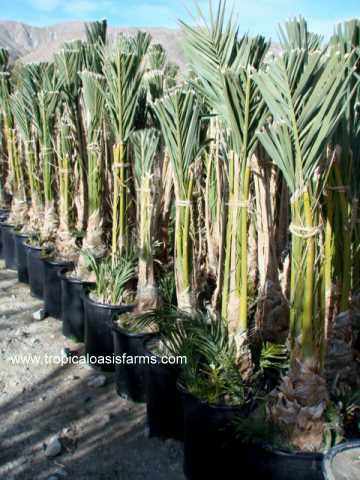
We have these rooted medjool date palm offshoots available for sale (please call 909 941 1060 for details).
Each year we remove medjool date palm offshoots in a variety of sizes and plant them in large pots and boxes to be sold or re-planted later.
Our smallest date palm offshoots are removed from the mother palm at about 5-6 years of age when they have about one foot of woody trunk.
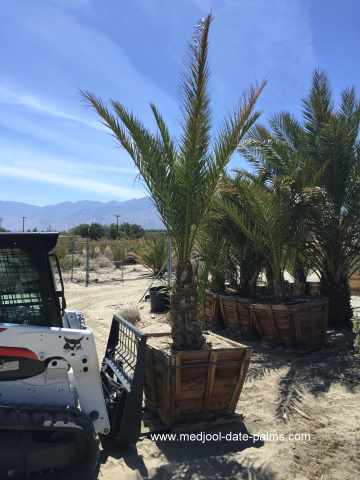 We also have large rooted medjool offshoots available in very big pots and wooden boxes with several feet of woody trunk! For medjool date palm offshoot sales information in California, call 909 941 1060.
We also have large rooted medjool offshoots available in very big pots and wooden boxes with several feet of woody trunk! For medjool date palm offshoot sales information in California, call 909 941 1060.
We suggest planting rooted date palm off-shoots instead of fresh cut date palm off-shoots. When fresh-cut medjool date palm offshoots are planted into large pots or wooden boxes and allowed to develop their own roots before being planting out in the field, they are known as rooted medjool date palm off-shoots. After 2 years in their pots, the surviving offshoots will have developed their own roots and are now cabable of sustaining vigorous new growth.
These rooted medjool offshoots will experience no transplant shock when properly planted and cared for. Rooted offshoots can be planted any time of year, unlike fresh cut offshoots which should only be planted in springtime.
Rooted medjool offshoot plantings begin medjool date production in just 1/3 to 1/2 the number of years required for fresh cut medjool offshoot plantings!!
Larger rooted offshoots can begin producing dates in just one year after being carefully removed from their container and planted out in the field! We have these larger rooted medjool date palm offshoots in stock right now - call 909 941 1060 for sales info in California.
Male Date Palm Offshoots & Female Date Palm Offshoots
When the date palm matures and enters its second developmental stage, buds will still continue to form in the new leaf axils of the now mature date palm, however these axillary buds that form in a mature date palm now develop into inflorescences.
Date palms are dioecious, which means that there are both male date palms and female date palms. After reaching maturity, the male date palm inflorescence yields flowers that produce the date palm pollen, and the female date palm inflorescence yields flowers which will become dates, if they are pollinated.
The famous medjool date palm cultivar is a female date palm, and the medjool dates that it produces are considered by many to be the "king of dates". Medjool dates are most well known for their unusually large size and their delicious flavor!
We have rooted medjool date palm offshoots in stock right now - call 909 941 1060 for information.
We also have rooted male date palm offshoots available right now. Male date palms are used extensively around California today in landscape design, and they also are the source of date palm pollen for pollination of female date palms. One male date palm provides enough pollen for several female date palms.
Please call 909 941 1060 for male date palm sales info in California.
How To Care For Medjool Date Palm Offshoots
Rooted medjool date palm offshoots are relatively easy to care for, and they are a good choice for both residential and landscape use. Date palm rooted offshoots in containers experience no die-back when properly planted and cared for.
Rooted date palm offshoots can be planted any time of year, as long as care is taken to not disturb the newly formed roots when removing the offshoot from the container and planting.
The rooted date palm offshoots can remain in their containers for a few extra years if necessary, as long as the palms are receiving at least some direct sunlight and the roots are never allowed to dry out.
Care should always be taken with rooted offshoots not to disturb their recently formed roots, both when handling their containers and when planting. Once planted out in the field, likewise the delicate new roots of the rooted medjool offshoots should never be allowed to dry out. Drip or flood irrigation systems are good. Never use sprinklers. In locations with dry summertime heat and well draining sandy soils, recently planted medjool date palm offshoots can be watered daily. With soils that do not drain as quickly, the recently planted date palm offshoots can be watered every 2nd or 3rd day in the summertime heat. Fertilizers should not be used for the first year after planting.
Fresh cut date palm offshoots are highly perishable, and they require experienced care. The amount and frequency of watering required by fresh cut offshoots depends on the soil type and the climate. Fresh cut offshoots should only be planted and tended by experienced growers.
Date Palm Seedlings
Date palms can also be grown from seed, however only about half the palms grown from seed will be females, and the quality of the dates produced by these female seedlings will vary considerably. The dates produced by female date palm seedlings are usually of inferior quality to extablished date palm cultivars.
In date palm seedling plantations, only about 10% of the palms produce fruit of satisfactory quality, and the dates from each of these seedlings are different from one seedling to the next. Marketing these non-uniform dates from a seedling plantation is difficult at best. Female date palms grown from seed also take a long time to produce dates, usually 10-12 years or more. The non-uniform crop from seedling date palm plantations is the primary reason for the recent abandonment of seedling date palm plantations worldwide in favor of date palm off-shoot plantations.
Tissue Culture Reproduction of Date Palm Varieties
In recent years, scientists have developed tissue culture reproduction techniques for propagating specific date palm varieties in large volume, however such propagation methods are expensive & experimental, and they are not normally employed in the date palm industry. We do not have any tissue culture date palms.
Offshoots of Other Date Palm Named Varieties
There are many other palms that produce edible drupes or dates, however their "dates" are almost all seed with very little flesh and most are quite small. Only phoenix dactylifera - the true "date palm" produces the large edible dates that are cultivated and sold today.
The female phoenix dactylifera palm yields dates that measure from 1 to 3 inches long with varying degrees of sweetness. Date varieties are classified as soft, semi-dry, and dry.
There are hundreds of named varieties of phoenix dactylifera date palms. We have offshoots available of several date palm named varieties including the most famous which is the amazing Medjool date palm.
The most widely grown date in the world today is the semi-dry Deglet Noor date palm. Please call 909 941 1060 for information on deglet noor date palm offshoots. A few of the other well-known date palm varieties for which we have offshoots available are the Barhi date palm, the Zahidi date palm, and the Halawi date palm.
Also, a "new" California date variety is the Honey JewelTM date. The Honey JewelTM date is amazingly delicious, soft and very sweet like honey in its fully ripe tamar stage of ripening. We will have offshoots of the Honey JewelTM date palm available again soon.
Each of these date palm varieties produce delicious dates with distinct differences in flavor, sweetness, moisture content, and size.
How To Buy Medjool Date Palm Offshoots
We offer true medjool date palm offshoots. Please call (909) 941 1060 for available sizes and pricing.
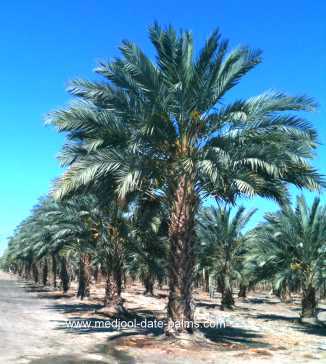
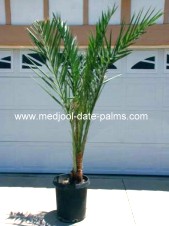
We have our own groves of male date palms & female date palms in California. We sell offshoots from these date palms in a full range of sizes including fresh cut medjool date palm offshoots that have just been removed from their parent palm, as well as rooted medjool date palm offshoots in containers.
We specialize in already rooted date palm offshoots in containers.
In addition to our male date palm offshoots, we offer a variety of female date palm cultivars including medjool date palm offshoots, zahidi date palm offshoots, halawi date palm offshoots, and barhi date palm offshoots.
Our Medjool date palm offshoots are available in all sizes from recently removed 5 year old medjool date palm pups or "offshoots" to fully mature medjool date palms.
Please call 909 941 1060 for our current medjool date palm offshoot pricing & availablilty in California.
Male date palms are a popular choice for use in landscaping, and also as a source of date palm pollen for pollination of female date palms. Female date palms produce dates, and they are planted in large plantations for commercial date production. Male date palms for landscaping are less expensive than most female date palm cultivars, while some female date palms grown from off-shoots of specific date cultivars have very limited availability and high demand.
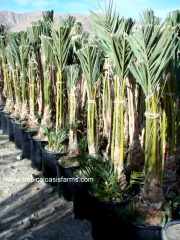 Our medjool date palm "rooted" offshoots are in containers of assorted sizes depending on the size of the palm. After these medjool date palm offshoots are removed from their medjool mother palms, they have to develop their own roots which takes 1-2 years, and they are then ready to be planted out in the field. Our smallest rooted medjool offshoots are 8 year olds. An 8 year old medjool date palm rooted off-shoot stands about 7 feet tall with 3 to 6 inches of woody trunk above the soil in its 15 gallon pot. We also have 10 year old and 12 year old rooted medjool offshoots in 15 gallon pots. These rooted medjool off-shoots are ready for planting. Please call 909 941 1060 for price information and how to purchase in California.
Our medjool date palm "rooted" offshoots are in containers of assorted sizes depending on the size of the palm. After these medjool date palm offshoots are removed from their medjool mother palms, they have to develop their own roots which takes 1-2 years, and they are then ready to be planted out in the field. Our smallest rooted medjool offshoots are 8 year olds. An 8 year old medjool date palm rooted off-shoot stands about 7 feet tall with 3 to 6 inches of woody trunk above the soil in its 15 gallon pot. We also have 10 year old and 12 year old rooted medjool offshoots in 15 gallon pots. These rooted medjool off-shoots are ready for planting. Please call 909 941 1060 for price information and how to purchase in California.
We also have 12 to 15 year old medjool date palm rooted offshoots for sale in 25 gallon pots for those who wish to grow their own dates at home with a shorter wait until date production, and we have some larger rooted medjool date palm offshoots for sale in large wooden boxes & in 65 gallon pots. Even larger size mature female medjool date palms are available for transplant directly from the field as well, however date palms that are transplanted directly from the field go thru a period of shock & die-back at the time of transplant, while rooted offshoots in containers keep right on growing with no die-back when cared for properly.
We specialize in female medjool date palm rooted offshoots for sale in 15 gallon pots & 25 gallon pots for those who wish to grow their own dates at home in their yard.
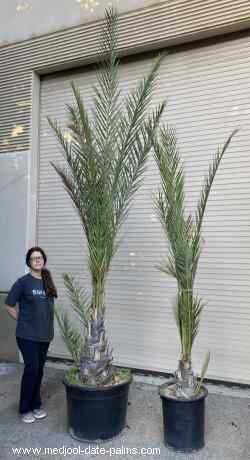
The photo at left shows rooted medjool date palm offshoots for sale in 15 gallon & 25 gallon containers.
These are vigorous well-rooted medjool offshoots with new green growth emerging, and they are ready to plant! With proper care, they will continue growing about one foot taller each year after planting in your yard.
In the photo at left, the smaller rooted medjool offshoot in the 15 gallon pot has about 10 inches of woody trunk above the ground, and the 25 gallon rooted medjool offshoot has about 18 inches (1.5 feet) of woody trunk above the ground.
This rooted medjool date palm offshoot with 1.5 feet of woody trunk above the ground is mature, and it is ready to produce medjool dates!
We have a few hundred rooted medjool date palm offshoots available for sale in this size right now
(In California, please call 909 941 1060 for details).
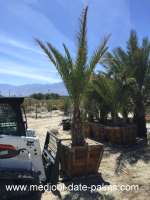
We offer larger rooted medjool date palms for sale in wood boxes as well. These mature date palms have from two feet to four feet of woody trunk, and they are ready to start producing delicious medjool dates!
In California, call (909) 941 1060 for details.
Our smaller size male date palm offshoots are also for sale in 15 gallon pots and in 25 gallon pots (male date palms are used for polination & for landscaping).
Older mature date palms are sold based on their age and the amount of woody trunk the palm has: a 12 foot tall date palm has about 2 feet of woody trunk, and a 20 foot tall date palm has about 10 feet of woody trunk.
Date palm rooted offshoots in containers experience no die-back when properly planted and cared for.
Larger date palms however, that are dug up in the field and shipped directly to the customer usually experience severe shock lasting up to a year or more before vigorous growth returns, and a significant percentage may not even survive. For this reason, we always recommend planting rooted date palm offshoots in containers rather than purchasing date palms directly from the field.
Please call 909 941 1060 for current price & availablilty of rooted date palm off-shoots in containers in California.
Very few nurseries offer named cultivars of true date palms (for example; medjool date palms), especially in smaller sizes. If you ask for a medjool date palm, beware of being offered a date palm seedling that was grown from a medjool seed! Date palms grown from medjool seeds are not medjool date palms, they are hybrid date palms! Medjool date palms can only be grown from medjool date palm offshoots, or "cloned" by cellular plant reproduction. By asking the right questions, you will find out if a nursery's "date palms" were grown from seed...
Growing Medjool Date Palm Offshoots in California
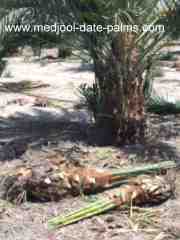
Offshoots of the medjool date palm variety were first imported into the USA from the Bou Denib Oasis in Morocco in 1927. At that time, the infamous "bayoud disease" had infected or killed almost all of the medjool date palms in Morocco. This shipment of eleven Medjool offshoots were the first and only Medjool date palm offshoots imported to the USA. These disease free Medjool offshoots were eventually planted at the US Department of Agriculture station in Indio, California. All Medjool date palms in the USA today are descendents from these original eleven Medjool date palm offshoots!
In the last few decades, the amazing medjool date palm has become very widely planted from the beaches of Southern California all the way across the State to the deserts along the California-Arizona & Nevada borders, both as landscape palms and also for date production in some areas.
Medjool date palms are also being grown in several other USA states including Texas, Louisiana, Florida, Arizona and Nevada.
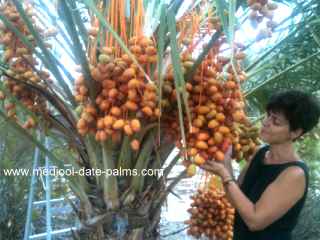 Ever growing numbers of California homeowners are planting medjool date palms in their yards to harvest a yearly crop of home grown medjool dates!
Ever growing numbers of California homeowners are planting medjool date palms in their yards to harvest a yearly crop of home grown medjool dates!
Medjool date palms are also being very widely planted today for their tropical landscape appeal. These regal date palms have become a very popular choice for both residential and commercial building landscape designs.
Some of the date palms used in landscaping are males and some are females. The female date palms are very desirable not only for their delicious dates but also for the tropical look they give to any landscape. Both male and female date palms are very popular because of their striking appearance & natural beauty, their ancient history & religious significance, and also because of their easy maintenance. A date palm can be very impressive as a single specimen, and group plantings can be truly spectacular. Date palms can live for 150 to 200 years in California, and they can eventually reach heights of over 80 feet tall.
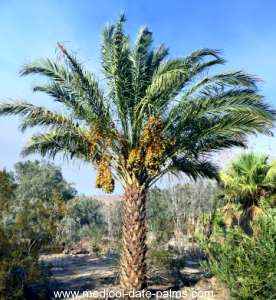
Date palms grow very well in most of Southern California, and in many parts of the State further north as well. Male date palms are often used in landscaping because once mature they do not yield the annual crop of dates which can sometimes attract pests. For female date palms, there are three main date palm varieties most often planted in California; the Medjool date palm, the Zahidi date palm, and the Deglet Noor date palm. Another less well know date palm variety that is also very desirable for its dates and for landscaping is the Halawi date palm, which is even larger than the Medjool date palm.
Deglet Noor date palms are also very commonly planted in malls & shopping centers around southern California where they give a tropical look to the landscape.
Medjool date palms have a larger and more full dense canopy when compared to the Deglet Noor, which has a canopy that is more sparse and open with fewer fronds. The Medjool and Zahidi date palms are very similar in appearance with beautiful silvery green foliage. The Zahidi date palm does have a slightly larger trunk than the Medjool and the Zahidi's canopy is slightly more full and dense - truly a beautiful landscape specimen.
Grow Your Own Medjool Dates
Medjool Date palms in California like full sun and lots of water in the summertime.
Rooted Medjool date palm offshoots can be planted any time of year.
Newly planted medjool date palm rooted offshoots require frequent watering until they are well established. In sandy soils during the dry heat of summer, recently planted medjool date palm offshoots should be watered once a day. Once they are established, date palms are very drought hardy and salt tolerant, and they can survive extended periods without watering.
Mature medjool date palms can withstand temperatures falling to several degrees below freezing for short periods.
For date production, medjool date palms require plenty of summertime heat & sun and air
with little moisture. The medjool date palms also require frequent irrigation during the hot summer months to yield a larger crop of dates!
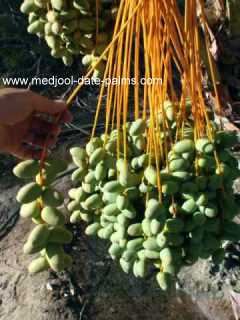
The medjool dates take about six months to ripen completely. There is a traditional name for each of the four stages of date ripening; kimri, khalal, rutab, and finally tamar.
The kimri stage lasts about 5 months and is basically while the dates are green. The next ripening stage is the khalal stage when the dates have grown to their maximum size and turn yellowish or reddish depending on the specific date variety. The medjool date is golden-yellow and quite large at this khalal stage. Next comes the rutab stage, when the dates begin to soften and lose their bright colors. The date becomes fully mature at the tamar stage.
Medjool dates are eaten at the fully mature tamar stage, although there are a few varieties like the the Barhi dates and the the Halawi dates that are also eaten at Khalal stage, when they are less sweet and still hard & crunchy like an apple! Please call 909 941 1060 to purchase our organically grown fresh picked halawi dates at this crunchy khalal stage.
Dates are classified as soft, semi-dry, and dry. The most widely planted "dry" date variety is the Deglet Noor date. The Medjool date is considered a "soft" date. The dry dates are commonly used in the middle east for everyday consumption. The sweeter dates are used as a dessert in the Middle East as well as in the United States.
Mature medjool date palms yield from 100 to 200 pounds of dates per palm each year, depending mainly on the amount of water and nutrients the palm receives while the dates are developing.
While the dates are maturing on the palm, the dates are preyed upon by birds, small mammals, and insects. Date farmers sometimes place a protective bag around each date cluster to prevent access to the dates and also for rain protection in some climates.
Soft date varieties like the Medjool date require special handling at the final ripening stage.
Medjool Dates
Among the sweeter date varieties is the medjool date, which is considered by many to be the "king of dates". The medjool date was once reserved only for the royal family of the Sultan of Morocco! This amazing date palm variety was first imported into the USA from the Bou Denib Oasis in Morocco in 1927.
The medjool date is most well known for its unusually large size and its delicious flavor. It can grow to about three inches long, and even though it is classified as a soft date the medjool date is firmer and more resilient than most other soft dates and it handles much better as well, making it a great choice for commercial production.
The Medjool date was brought to the United States through the United States Department of Agriculture. There was a disease in Morocco that was spreading quickly among the Medjool date palms and a Moroccan official offered some shoots to a representative from the USDA which in turn were eventually planted in California. The medjool is now thriving in California as one of the primary date cultivars.
Medjool date palms are also very popular for landscaping because of their regal appearance and full canopy. Medjool date palms have a larger and more full dense canopy when compared to the Deglet Noor, which has a canopy that is more sparse and open with fewer fronds. The Medjool and Zahidi date palms are more similar in appearance with beautiful silvery green foliage.
Fresh Medjool Dates For Sale
We grow our delicious medjool dates organically with no chemical fertilizers, no pesticides, and no preservatives; they are pure naturally sweet medjool dates! Did you know that medjool dates are 100% fat free? Our fresh picked medjool dates are available for purchase each year in October & November, just in time for Christmas!
This year, we will once again have a limited quantity of fresh picked organically grown medjool dates available. Each year we do sell out before the crop is picked, so be sure to place your order early! We begin taking orders each year on August 25 for our organically grown medjool date crop.
Honey Jewel DatesTM
A very sweet and delicious California date variety is the "new" cultivar named the Honey JewelTM date.
The Honey JewelTM date is amazingly delicious, soft and very sweet like honey in its fully ripe tamar stage of ripening.
Dates are classified as soft, semi-dry, and dry. The Honey Jewel date is very soft at the fully ripe tamar stage.
We have fresh Honey Jewel dates available each year at their tamar stage of ripening when they are fully ripe and soft at the end of September.
We will have a limited amount of Honey JewelTM dates available this year. We begin taking orders each year on August 25 for our organically grown Honey JewelTM date crop.
Halawi Dates, and Halawi Date Palms
Halawi dates (also known as Halawy) are a very sweet soft date variety of medium size with wonderful caramel-honey like flavor. The halawi date palm variety originated in Mesopotamia and has been propagated by off-shoots for millenia. The name halawi actually means "sweet" in Arabic. In some cultures, the halawi date is eaten at the khalal stage when it has become yellow and is still crunchy like an apple. The flavor at this crunchy khalal stage is still sweet but very different with just a hint of astringincy (to order fresh organically grown Halawi dates at this yellow crunchy khalal stage, please call (909) 941 1060). If allowed to ripen further, the Halawi date will next enter the rutab stage where it begins to turn a beautiful golden-amber color as it softens and becomes very sweet and delicious.
Halawi date palms grow well in Southern California. When used for landscaping, the halawi date palm trunk and canopy are larger than both the medjool and the zahidi, making the halawi date palm a truly spectacular landscape palm specimen!
We will have a limited amount of fresh picked Halawi dates available this year. We begin taking orders each year on August 25 for our organically grown halawi date crop.
Zahidi Dates, and Zahidi Date Palms
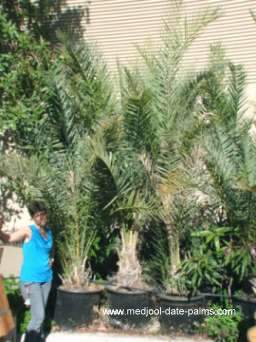
Zahidi date palms (in different regions, this variety is also known as Zehedi, Zadie, and originally from the Persian Azadi) yield a very sweet and delicious medium size date that is basically a dry date, although it can be used as a soft date or as a dry date depending on the length of time it is allowed to remain on the palm.
The zahidi date palm is an ancient cultivar from Mesopotamia dating back millenia, and the name meant Nobility in ancient Persian. Fully ripe zahidi dates have beautiful golden-yellow color and they are early season.
The Zahidi date palm rooted offshoots shown at left are 12 year old rooted off-shoots in 25 gallon pots.
We have female zahidi date palm rooted offshoots available in 25 gallon pots with special pricing. These rooted zahidi offshoots stand from 15 feet tall and have from 2 feet of woody trunk, and they are mature enough now to start producing dates! Please call (909) 941 1060 for pricing.
Zahidi date palms are very vigorous as well as prolific in fruiting, and they do grow well in Southern California. For landscaping, the zahidi date palm is among the finest of the date palms. The zahidi trunk and canopy is very similar to the medjool date palm with beautiful silvery green foliage, and the zahidi has a slightly more dense upright canopy than the medjool. Like the medjool, the zahidi date palm is highly prized for the quality and flavor of its dates, as well as for its majestic appearance.
Our Zahidi date crop is not available for sale this year.
Date Nutritional Information
Dates are highly nutritional and many believe them to be one of natures most perfect foods! People of the Middle East have consumed the fruit of the date palm for thousands of years as part of their diet.Dates contain polyphenols, which are a plant antioxidant that can destroy disease causing free radicals.
Dates have 20 different kinds of amino acids, which aid in the digestive process. Dates are very rich in both vitamins and minerals, and they contain more potassium than an orange or a banana per ounce. These nutritious fruit of the date palm contain vitamins A, A1, B1, B2, B3, B5, and B6. Dates also are rich in oil, calcium, sulfur, iron, potassium, phosphorous, manganese, copper, protein and fiber. Dates are fat free, cholesterol free, and they are very low in sodium. Dates also are high in carbohydrates, and they are an excellent source of quick energy. Dates are helpful to people suffering with anemia and fatigue, and dates act as natural laxatives which can be an easy remedy for constipation. In most date varieties, the sugar content of a date is almost entirely of the inverted forms glucose and fructose (except for deglet noor dates and thoory dates which have higher percentages of sugar in the form of sucrose). This is very important important for people who cannot tolerate sucrose. The invert sugar in dates is immediately absorbed by the human body without the need for digestion that ordinary sugars like sucrose undergo.
Traditionally, the fruit of the date palm has been used for treating many kinds of ailments in the Islamic world including the treatment of respiratory disorders, and to stimulate the heart rate. Dates also have traditionally been processed into a salve for treating certain kinds of wounds. The fruit of the true date palm also is recommended for consumption by lactating women to add extra nutrition into their diet. The Plant Sciences Division website at the University of California at Davis, states that Bedouin Arabs who eat dates on a regular basis have shown an extremely low incidence of cancer and heart disease when compared with people who do not eat dates regularly.
Dates also are an excellent choice for emergency food rations because of the date's high caloric content & nutritional value combined with the fact that dates keep well without refrigeration for long periods of time.
Medjool Date Palm Offshoots Used For Landscaping
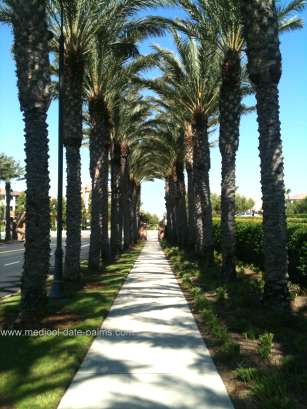 Date palms have recently become very popular as landscape specimens in subtropical areas across the globe, and especially in Southern California! The true date palm varieties are more expensive than most other types of palms used in landscaping, however these true date palms are very desirable not only for their delicious dates but also for the tropical look they give to any landscape.
Date palms have recently become very popular as landscape specimens in subtropical areas across the globe, and especially in Southern California! The true date palm varieties are more expensive than most other types of palms used in landscaping, however these true date palms are very desirable not only for their delicious dates but also for the tropical look they give to any landscape.Date palms are very popular due to their striking regal appearance, their natural beauty, and also because of their easy maintenance. There also is considerable renewed interest in the date palm because of the date palm's ancient history and religious significance. A date palm can be very impressive as a single specimen, and group plantings can be truly spectacular. The date palm can live to the age of about 200 years, and they can eventually reach heights of about 80 feet tall.
Date palms grow well throughout Southern California where they are used mostly in landscaping.
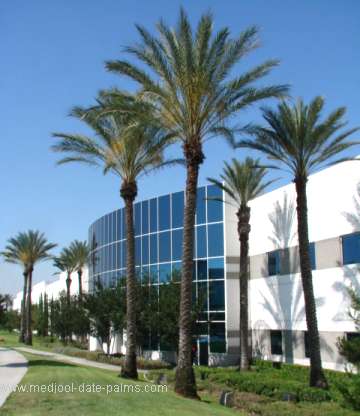
Deglet Noor date palms are commonly planted in shopping centers and malls in southern California where they lend a striking tropical ambience.
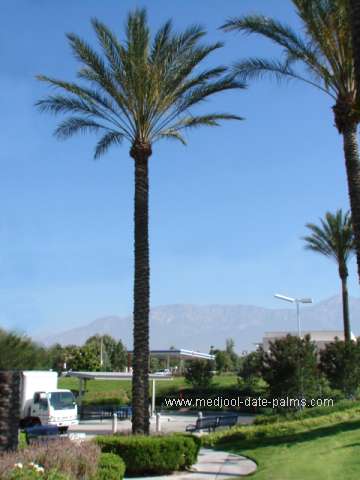
Medjool date palms grow taller each year, and it becomes more costly and dangerous to harvest the dates as they get taller.
Commercial date growers in California usually end up selling their older date palms that have become too tall for harvesting dates. These large date palm specimens are ideal for many landscaping projects!
In Southern California it not unusual to see tall date palm specimens providing shade in the parking lots of convenience stores and fast food restuarants. Date palms are also very popular in landscape designs for commercial buildings.
Frequently Asked Questions
- SHIPPING: For medjool date palm offshoots in 15 & 25 gallon containers, we recommend that you transport the date palms in your pick-up truck. Local delivery to your driveway can usually be arranged (only in Southern California) with a delivery cost from $50 to $150 depending on the round-trip mileage (50 mile maximum round-trip travel distance). Transport for large medjool date palms can also be arranged in Southern California.
- Our medjool dalm palm rooted offshoots (and our other date palm cultivars) are grown near Indio, California. Smaller size medjool date palms are available for pick-up in Rancho Cucamonga, California, by appointment only. Delivery of medjool date palm trees to customers in Southern California can be arranged. We do recommend that you hire an experienced landscaper (we do not offer landscaping services!) for planting and irrigation of date palms.
- Sub Tropical Fruit Trees: Available for pick-up in Rancho Cucamonga, California, by appoinment only, at one of our two locations.
- PAYMENT: We accept Cash, Check, American Express, Visa, Mastercard & Discover. You can pay in advance or at the time of pick up.
- MEDJOOL DATES: fresh picked medjool dates are available each year in October, organically grown in California.
- GUARANTEE: We guarantee our plants, fruits and trees to be in good condition at the time of sale.
- For all other questions, you may contact us at: Tropical Oasis Farms, PO Box 1011, Rancho Cucamonga, California 91729
© Copyright 2000-2025 -
